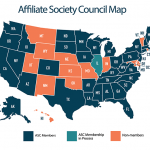On Aug. 30, the Affiliate Society Council (ASC) held a landmark roundtable meeting featuring ACR President Kenneth G. Saag, MD, MSc. This meeting, which was the first time an ACR president has met with the ASC, signals the ACR’s commitment to further building partnerships with state societies and its understanding of the important role these societies play in advancing the practice of rheumatology.
The ASC has been an integral part of the ACR’s advocacy work, but the purpose of the roundtable was to provide the ASC with a broader view of the ACR, including an overview of the strategic priorities of the ACR and ARP. Dr. Saag gave detailed updates on ACR Convergence, COVID-19, workforce initiatives, advocacy efforts and diversity, equity and inclusion initiatives. More importantly, he started what will be an ongoing conversation between the ACR and state society leadership.
Updates from State Leaders
Dr. Saag made it clear at the outset that the main goal of these meetings is for the ACR to listen to the rheumatology community. To accomplish that goal, the remainder of the meeting after his presentation was allotted for state society updates. During this portion of the meeting, some ASC members voiced concern over issues they are confronting in their states. Here are brief highlights of updates given by some state rheumatology societies:
- Florida: Florida Society of Rheumatology representatives discussed recent progress in the state on step therapy and pharmacy benefit manager reform.
- Iowa: The Rheumatology Association of Iowa is working on legislation to prevent nonmedical switching, copay accumulators and white bagging.
- Maryland: The Maryland Society for the Rheumatic Diseases discussed ongoing efforts to strengthen the state society, including having its first annual meeting and expanding its advocacy work.
- New York: ASC Chair Manuela Marinescu, MD, detailed the New York State Rheumatology Society’s efforts to ban copay accumulator policies and white bagging. She also shared concerns about the barriers to in-office dispensing in New York and other states.
- Ohio: The Ohio Association of Rheumatology discussed its efforts to curb white bagging, downcoding and nonmedical switching.
- Pennsylvania: The Pennsylvania Rheumatology Society is working to increase its advocacy capacity and discussed federal and state prior authorization reform efforts.
- Texas: The State of Texas Association of Rheumatologists discussed the state’s new prior authorization “gold card” law and some of the challenges of implementing that legislation.
Gwenesta Melton, MD, highlighted the recent Association of Women in Rheumatology (AWIR) meeting and AWIR’s efforts to encourage members to give to RheumPAC. She also highlighted the resources AWIR has developed for fellows, including advocacy training continuing medical education.
The Path Forward
Some common themes emerged from the state updates, making it clear that some pain points are shared across states. Many of these are already policy priorities for the ACR and our partner organizations. To increase collaboration as we work toward those goals, the ASC will now have optional bimonthly “advocacy huddles” that will serve as opportunities for state leaders to talk directly with ACR advocacy staff about federal, state, regulatory and payer issues they may be confronting. The frequency of those meetings will increase during the spring, which is the most active state legislative period. It is our hope that these meetings will allow the ACR to further engage with and support state society efforts.
The rheumatology community is relatively small compared to some other medical societies, but enhanced collaboration and communication are the keys to our future success. As the adage states, there is strength in numbers. That is why it is important for rheumatology professionals to join their state or local society as well as the American Medical Association, the ACR or other national professional societies. If you would like more information about joining your state or local society, contact [email protected] or search on the ACR website for societies in your area.
While it is true that there is strength in numbers, it is equally true that there is power in relationships. The ACR is committed to building stronger relationships with state societies and our partners in the rheumatology community. The ASC roundtable with Dr. Saag was one important step in that ongoing process.
Joseph Cantrell, JD, is the director of state affairs and community relations for the ACR.

